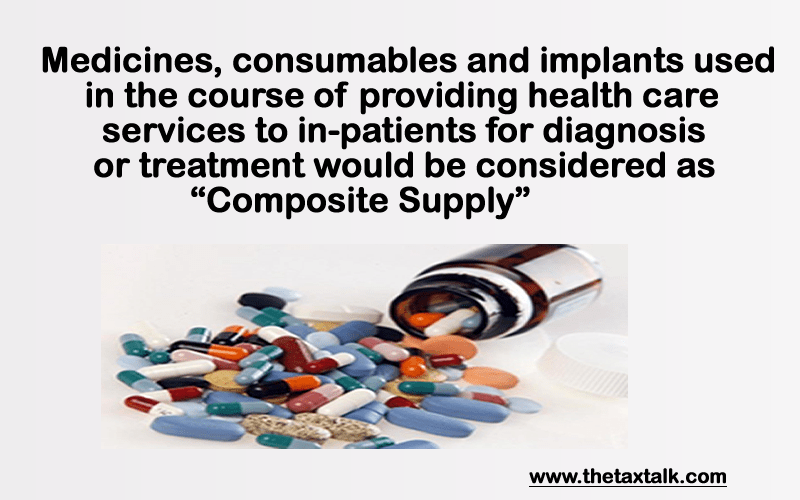![]()
Medicines, consumables and implants used in the course of providing health care services to in-patients for diagnosis or treatment would be considered as “Composite Supply”
Medicines, consumables and implants used in the course of providing health care services to in-patients for diagnosis or treatment would be considered as “Composite Supply” and eligible for exemption under the category ‘health care services’?
The applicant was a multi-specialty tertiary care hospital providing health care services. They had categorized the patients as Out-Patients and In-Patients for the administrative convenience. The in-patients were those who were admitted in to the hospital for the required treatment and were provided with stay facilities, medicines, consumables, implants, dietary food and other surgeries/ procedures required for treatment. The in-patient pharmacy and operation theater pharmacy supplied medicines and consumables only to in-patients.
Observation: If nature of services is such that one of the services is main service and other services combined with such service are in the nature of incidental or ancillary services which help in better utility of main service then various elements of service are said to be naturally bundled in the ordinary course of business.
In-patients expect from hospital to provide health care services by way of appropriate diagnosis, appropriate medicines as well as relevant consumables or implants as part of treatment under supervision till discharge. Therefore, medicines, implants etc used in the course of providing health care services to in-patients is undoubtedly naturally bundled in the ordinary course of business.
For an outpatient, he can procure medicine either from dispensing outlet within the hospital or from outside the hospital. Therefore pharmacy run by hospital dispensing medicine to outpatient or bye standers or others is treated as individual supply of medicine and not covered under the ambit of health care services. Hence such supply of medicine and allied goods are taxable.
Hence, supply of medicines, consumables and implants used in the course of providing health care services to in-patients for diagnosis or treatment are naturally bundled and are provided in conjunction with each other, would be considered as “Composite Supply” and eligible for exemption under the category ‘health care services’.
KIMS Health Care Management Ltd.[2018] 99 taxmann.com 37 (AAR – Kerala)

